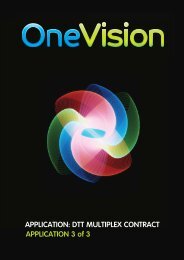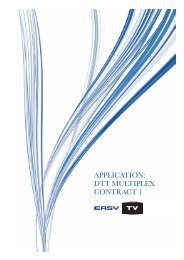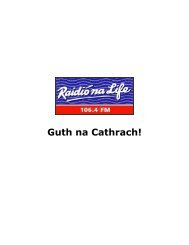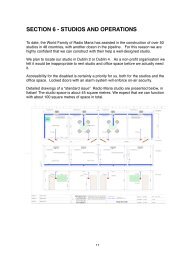Digital Radio for Ireland: Competing Options, Public Expectations - BCI
Digital Radio for Ireland: Competing Options, Public Expectations - BCI
Digital Radio for Ireland: Competing Options, Public Expectations - BCI
Create successful ePaper yourself
Turn your PDF publications into a flip-book with our unique Google optimized e-Paper software.
<br />
• Nearly 45% of radio operators do not believe that <strong>Ireland</strong> needs more radio services, more <br />
radio is supported by just under 37%. RTE, community and not <strong>for</strong> profit services are most <br />
likely to support more radio services. <br />
• Lack of an industry‐wide plan; the current economic climate as well as the perceived lack of <br />
public demand were identified as the main barriers to the roll‐out of DTSB in <strong>Ireland</strong>. <br />
• The majority of commercial operators believe radio businesses need to be given incentives to <br />
make the transition to digital radio and that these incentives should go beyond the proposed <br />
six year licence extension in The Broadcasting Act 2009. <br />
• Over 90% ranked ‘live internet streaming’ as important to their operation and internet‐related <br />
services were viewed as the most important priority with regard to future investment. <br />
• The most frequently cited reasons <strong>for</strong> developing web radio services were those of extending <br />
the reach of radio beyond the FM franchise area. <br />
Strategic Interviews <br />
Interviews with a representative group of senior executives in the radio industry highlighted the <br />
following issues: <br />
• There was a strong consensus on the need <strong>for</strong> a coordinated policy on digital radio to be led <br />
by the State agencies and guided by a representative digital radio <strong>for</strong>um which reflected both <br />
stakeholders and interested parties in its membership. <br />
• Most interviewees favoured DAB+ as the optimum technological solution <strong>for</strong> <strong>Ireland</strong>’s future <br />
based on their understanding of its increased efficiency as a plat<strong>for</strong>m over DAB. <br />
• There was broad agreement that incentives <strong>for</strong> the sector were needed as part of the <br />
transition but about half the interviewees made the point that the endgame needed to deliver <br />
a broadcast plat<strong>for</strong>m which was better than FM, or exceeded the current service to users, if it <br />
was to succeed with consumers and create a viable market. In this context, however, it was <br />
signaled by a number of interviews that such incentives to enter the digital radio market <br />
needed to be married with a requirement to innovate in order to ensure the success of digital <br />
radio in the long term. <br />
• Many respondents argued that lessons needed to be learned from the RTÉ‐led digital radio <br />
trial of 2007‐8 and that a more coordinated and consultative approach, emphasizing extensive <br />
market research, was required. <br />
• <strong>Digital</strong> radio was perceived to be not inclusive of all potential stakeholders, particularly small <br />
scale operators and community services. There was a lack of in<strong>for</strong>mation available on digital <br />
radio and consequently there was a need <strong>for</strong> an awareness‐raising and educational campaign <br />
around digital. <br />
• The question of the economic viability of a future digital radio market was highlighted as was <br />
the difficulty in promoting the case <strong>for</strong> digital radio in the midst of a severe recession that is <br />
already negatively impacting on the Irish media sector. <br />
6






